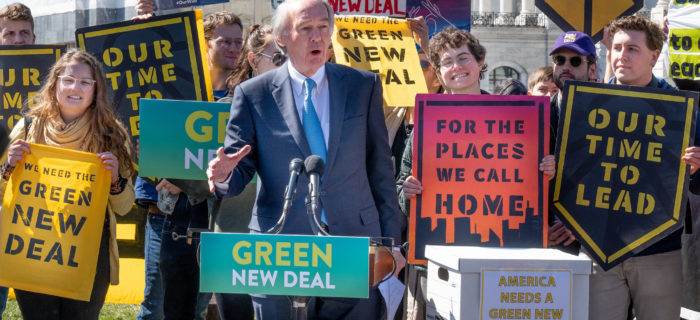A Green New Deal: The Specter Haunting Congress
Everyone knew that the odds of the Green New Deal (GND) making it through the present Congress were slim to zero. So why did Senator Mitch McConnell (R-Kentucky) rush a vote on the Resolution without any hearings? Simple: he’s terrified.
Tuesday’s vote showed everyone just how deeply fearful many politicians are of the social momentum building behind the GND. They’re afraid of any legislation remotely reminiscent of the original New Deal and the notion that power might be redistributed from the private sector to the public sphere. After all, Republicans, along with the majority of Democrats, have spent the last four decades accepting oil money, deregulating monopolies, and privatizing everything in sight—effectively rolling back what was left of the working class gains and structural reforms ushered in by the New Deal, 70 years ago.
Republicans rushed to demonize anyone supporting sweeping climate change legislation like the Green New Deal as elitist, economy-killing socialists (a tactic reminiscent of the Cold War). The early vote was an attempt to embarrass Democrats. With a red-baiting rhetorical flourish, McConnell exclaimed, “I could not be more glad that the American people will have the opportunity to learn precisely where each one of their senators stand on this radical, top-down, socialist makeover of the entire US economy.” But Senate Democrats—including supporters of the GND like Kamala Harris and Bernie Sanders—refused to take the bait, voting “present” to protest the sham vote. Tuesday’s vote is only the beginning of a much larger and protracted fight.
The Green New Deal is already a litmus test for presidential political candidates of the Democratic Party because of strong support from its base. And unlike previous tepid attempts at climate change legislation that were careful not to challenge the neoliberal order, the GND connects climate change with broader social and economic reforms.
While neoliberal Democrats may deride the Resolution as a “Green Dream, or whatever they call it,” or find it unrealistic because it covers too wide a spectrum of issues, the reality is that taking on climate change requires broad-based, structural reforms that must also challenge economic and social injustices.
As Richard Walker of the Living New Deal project recently conveyed, “If you don’t deal with the needs of working people, you can kiss all major climate policies goodbye.”
Building political power among broad swathes of the population to tackle climate change means linking climate reforms to social justice, jobs, fair wages, and other multi-racial and working class issues throughout both urban and rural America. The original New Deal was politically viable only because the Roosevelt Administration addressed the concerns of agriculture and labor, broke up the trusts, and used public financing to build infrastructure, conserve soil, and put the country back to work. The New Deal was a catalyst that brought farmers, unions, workers, and the unemployed together to roll back corporate power and rebuild the countryside and the shattered economy in a way that helped redistribute—rather than concentrate—the nation’s wealth.
Stay in the loop with Food First!
Get our independent analysis, research, and other publications you care about to your inbox for free!
Sign up today!There might not be enough political will right now to bring the Green New Deal to a successful vote. But the Resolution offers an opportunity for food, farm, and climate justice movements to converge with labor and frontline community organizers to demand a Just Transition. This might mean, for example, that climate and food activists would have to join labor to ensure that a transition would be unionized. Such a coalition would have to bring low-wage labor into the fold, from precarious gig economy Lyft/Uber drivers and toiling Amazon warehouse workers, to the cheap labor that makes up America’s largest economic sector: the food industry. Rebuilding a robust public sector would have to be central to a Green New Deal that would also help ensure good jobs for people of color and women.
As we have argued, for the Green New Deal to be politically viable in Congress, it must substantially address the needs of rural America, from job programs, health services and infrastructure, to transforming the food and farm system with structural reforms. These would include parity prices, supply management, breaking up agribusiness, investing in agroecology, and equitable land access.
Today, 78% of Americans believe that climate change is happening. From wildfires and droughts, to the intensification of massive storms, people are becoming more aware than ever that we are in crisis. Fear alone won’t be enough to mobilize a movement to force politicians to take effective action—but connecting climate to the economic misery and social injustices felt every day by millions of working class people in urban and rural America, just might.
Cover image by Victoria Pickering. Rally for the Green New Deal on 3/26/19, shortly before the vote scheduled by Mitch McConnell.


 Help Food First to continue growing an informed, transformative, and flourishing food movement.
Help Food First to continue growing an informed, transformative, and flourishing food movement.




